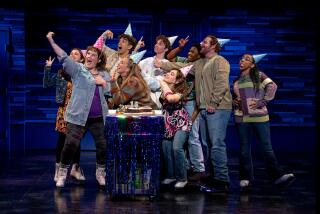Teaser for a Gospel Musical With Big Ambitions
- Share via
If Walter Robinson’s new gospel musical, “Look What a Wonder,” teaches its audience anything at this point, it should be the power of persistence. The artist-in-residence at the W.E.B. DuBois Institute at Harvard, Robinson has been toiling over this score for the last nine years and his efforts are finally bearing some fruit this spring.
A troupe of seven singers and two pianists sponsored by the educational group Facing History and Ourselves performed a shortened concert version in seven major cities, making its final stop at Pasadena’s All-Saints Church on Friday night. And on this same night, the complete work was being staged for the first time in Boston, with hopes for an eventual Broadway engagement.
Persistence fuels Robinson’s labors and the subject of his music, the minister and former slave Denmark Vesey, who was hanged for leading a slave rebellion in Charleston, S.C., in 1822. Another composer might have inflated the subject into grand opera, but Robinson has apparently stuck with earthier materials: hand-clapping, bedrock gospel music with occasional less-stimulating stabs at R&B; power ballads.
Underline the word “apparently,” because when a 2 1/2-hour score is reduced to a 45-minute concert version, with narrator Bashir Abass Salahuddin giving us the barest of plot summaries in between numbers, something may be missing in the reduction. Also, if there were any depths or ambiguities in the musical’s portrayal of Vesey, his family and his times, they did not surface Friday.
But Robinson has tapped convincingly into the inspirational energy of gospel in the score’s more unbuttoned moments, especially when he gets the ensemble rocking in numbers such as “Build God’s Church,” “The Truth Shall Make You Free” and an irresistible list song about a feast, “The Food Song.”
Roscoe Mills, who sounds a bit like the late Donny Hathaway, sang the role of Vesey; Roberta Thomas unleashed histrionic gospel fervor as his wife; and she and Don Corey Washington simulated the vibrato-less voices of Vesey’s young children in a touching manner.
The amplification on the voices, though, was often shattering and probably unnecessary, particularly when the cast’s wailing gospel cadenzas were careening off the walls.
More to Read
The biggest entertainment stories
Get our big stories about Hollywood, film, television, music, arts, culture and more right in your inbox as soon as they publish.
You may occasionally receive promotional content from the Los Angeles Times.










